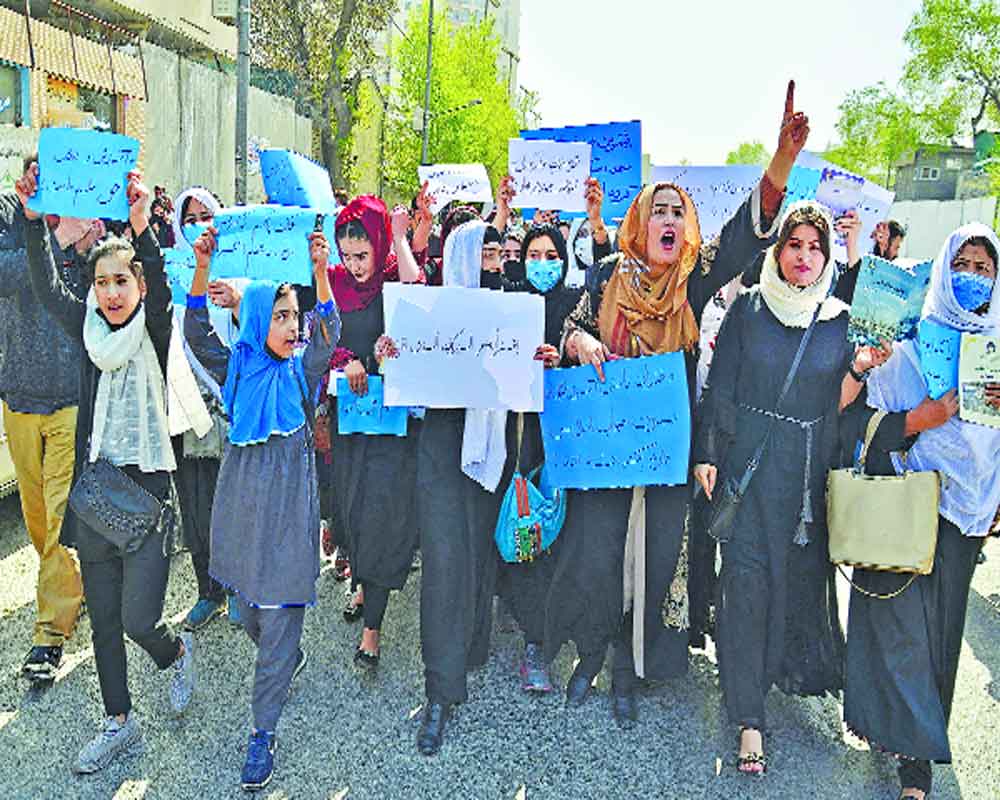The women in Afghanistan are not allowed in schools. It is high time the world community took note and did something about it.
Historical evidence shows that circumstantial adversaries and crisis situations such as the pandemic, humanitarian and security threats, as well as climate change, have tested and even reversed the progress in expanding women’s rights and opportunities across the world. There is also evidence that reversal of democratic processes has adversely impacted the rights of women. The takeover of Afghanistan by the Taliban can be seen as one such adversary that has not only stunted the progress but also reversed the established democratic environment. The recent decisions by the Taliban for a nation-wide ban on university education for girls can be seen as a violation of Afghan women’s right to education and freedom.
Derailment of Women Rights
Over the past one year, Afghanistan has witnessed heightened restrictions and a rapid reversal of women’s rights, impacting their future in terms of education, employment, healthcare, freedom of movement and even participation in public and political life. Various policies announced by the Taliban regime is indicative of systematic exclusion of women from public life such as the recent nation-wide ban on education, dissolution of ministry dedicated to women’s interests and welfare, the absence of women in the cabinet, restraints on women’s free movement who are to be accompanied by a male relative (mahram) and to cover faces in public, and depriving women their right to work as enshrined in the 2004 Constitution. Women’s position in the media landscape has changed rapidly too. For instance, in November 2021 a media restriction introduced by the Taliban regime prohibited women from appearing in television dramas.
On account of the regressive and repressive policies of the Taliban regime Afghanistan ranked last (170 out of 170 countries) on the Global Women, Peace and Security Index 2021, reflecting the abysmal situation of women and girls across many provinces in the country. According to UN Women, approximately 60% of children who are out-of-school are young Afghan girls and only 4.9% of women are accessing tertiary education, compared to 14.2% of men. Further, according to a UNDP report, Afghanistan may incur an immediate economic loss of up to US$1 billion — or up to five percent of the country’s GDP due to restrictions of women from work.
Domestic Resistance
When the Taliban took over Afghanistan, Ms Pramila Patten, Special Representative on Sexual Violence in Conflict, urged the international community to sustain its attention and action to ensure women’s rights are non-negotiable. The restrictive policies of the Taliban in Afghanistan specifically aimed at the rights and freedoms of Afghan women and girls have disrupted the cycle of women development, examined at the 9075th UNSC meeting. Speaking to the UNSC, Yalda Hakim, international correspondent and news presenter for BBC News, underscored that “Afghanistan is now the only country in the world where girls are prevented from getting an education, locked out of their classrooms, simply because of their gender”.
The international community needs to understand that the repercussions of depriving women of the right to education, employment, freedom of movement and expression in Afghanistan will be felt world-wide. The most discernible impact with global effects will be felt in the performance of the country in terms of Sustainable Development Goals (SDGs) committed to promote gender equality, women empowerment, and women led-development, which has severely deteriorated in Afghanistan in the last one year since the Taliban take-over.
Considering the recent curtailment of women's rights to education, the global players need to bring a consensus on mainstreaming Afghan women rights. In achieving this, multilateral forums such as the W20 (Women 20) platform, under the current G20 presidency of India can prove instrumental. Second, the international community must collectively strengthen international cooperation in upholding UNSC Resolution 2593 to uphold women’s rights and their full and equal participation in the political settlement of Afghanistan. To achieve this, the neighbouring countries, in collaboration with the international community, need to be more proactive on the diplomatic and security front and insist on guaranteeing respect in the full spectrum of women’s rights as a priority, aligning national and international interest. Third, to foster ‘generation equality’ the world community needs to stand with the Afghan women and support their cause to fight against the systematic exclusion of women from public life enforced by the Taliban regime. This may also help the regime to realize and acknowledge that participation of women at all levels is paramount for the country as inclusive development cannot be based on exclusive policies in complete disregard of the contribution of women to the society at large.
(The writer is a Delhi based researcher. She worked as Senior Researcher at Public Policy Research Centre (PPRC), New Delhi. The views expressed are personal.)


























